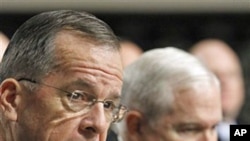Members of the U.S. Senate lined up on opposing sides of the issue of allowing homosexuals to serve openly in the military during a hearing on Thursday. The split along Democratic and Republican Party lines was evident as senators questioned U.S. Defense Secretary Robert Gates and other senior officials.
Nearly two years after President Barack Obama took office with a promise to change the law, and nearly a year after the Pentagon launched a study on the impact of doing so, the Senate Armed Services Committee met to consider whether to take a step in that direction.
Congress passed the current law 17 years ago easing the military ban on homosexuals and enabling them to serve, if they keep their sexual orientation a secret. At that time, President Bill Clinton wanted to end the ban. But senior military officers opposed the plan and members of Congress adopted the compromise known as "Don't Ask, Don't Tell."
Now the situation is different, and proponents of allowing homosexuals to serve openly think they have their best chance ever to make it happen.
While there still is concern among some senior military officers - and the committee will hear from some of them on Friday - others support the effort. A Pentagon survey of troops and their families, published on Tuesday, indicates that although there is some opposition, particularly in combat units, there is wide support for ending the ban. Officials concluded that with proper preparation and training, the change can be implemented without hurting the effectiveness of the U.S. military, even in this time of war.
The Senate Armed Services Committee chairman, Democrat Carl Levin, has long supported changing the law. He said the study gives him confidence that it is the right course.
"We can end 'Don't Ask, Don't Tell' and maintain our military strength, respect our troops and their families, allow patriotic Americans to serve their country without regard to sexual orientation, and uphold the principle that service and advancement in our military are based on merit alone," said Senator Levin.
But the senior Republican on the committee, Senator John McCain, strongly disagreed. He said the survey reaches no clear conclusion. He expressed particular concern about reluctance expressed by combat troops. And McCain had a sharp reaction when Secretary Gates summarized the report's main conclusion.
GATES: "With time and adequate preparation, we can mitigate their concerns."
MCCAIN: "Well, I couldn't disagree more. We send these people into combat. We think they're mature enough to fight and die. I think they're mature enough to make a judgment on who they want to serve with and the impact on their battle effectiveness. Mr. Secretary, I speak from personal experience."
McCain served in the U.S. Navy during the Vietnam War and was held prisoner by the North Vietnamese for 5.5 years.
Earlier in the hearing, the top U.S. military officer, Navy Admiral Michael Mullen, noted his 42 years of service in the military, including many command assignments. He said the new study provides data to support his view that from the perspective of morality and integrity, homosexuals should be allowed to serve openly in the military.
"You do not have to agree with me on this issue," said Admiral Mullen. "But don't think for one moment that I haven't carefully considered the impact of the advice I give on those who will have to live with the decisions that that advice informs. I would not recommend repeal of this law if I did not believe in my soul that it was the right thing to do for our military, for our nation and for our collective honor."
Mullen is the chief military adviser to Secretary Gates and President Obama. And like all senior U.S. military officers, he is required to give his honest opinion to the Congress.
Thursday's hearing was potentially a key step in the process of reviewing the "Don't Ask, Don't Tell" law. The House of Representatives has already passed a repeal and the Senate has only a few weeks to act before it adjourns. When the new Congress convenes in January, the House will be controlled by the Republicans, based on the results of last month's elections. And they generally oppose changing the law.
On Thursday, Secretary Gates repeated his concern that if Congress does not act, the courts will declare the current law unconstitutional because it is discriminatory. A federal judge did that in October, but her order was put on hold by a higher court while the case is appealed. Gates said the change should come from the Congress and that it should be done in a carefully prepared way, rather than suddenly, as a court order might do.







